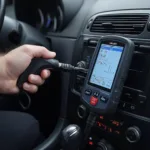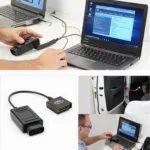If you’re troubleshooting car problems, you might be wondering, “Will an OBD2 scanner link if the PCM is bad?” A faulty Powertrain Control Module (PCM) can cause all sorts of headaches, and knowing whether your scanner can communicate with it is crucial for diagnosis. This article delves into the connection between OBD2 scanners and a potentially bad PCM, providing valuable insights to help you understand the issue and take the right steps.
A failing PCM can severely impact a vehicle’s performance, leading to misfires, poor fuel economy, and even a no-start condition. When faced with these issues, your first instinct might be to grab your trusty OBD2 scanner. But will it even connect if the PCM is the culprit? The answer isn’t a simple yes or no. Let’s explore the complexities of this diagnostic challenge.
Understanding the OBD2 and PCM Relationship
The OBD2 system acts as your car’s communication hub, allowing a scanner to access data from various electronic control units (ECUs), including the PCM. The PCM is the brain of your vehicle’s powertrain, controlling vital functions like fuel injection, ignition timing, and emissions. A functional connection between the OBD2 port and the PCM is essential for retrieving diagnostic trouble codes (DTCs) and monitoring live data.
If the PCM is completely fried, the OBD2 scanner might not be able to establish a connection. However, a partially functioning PCM might still allow a limited connection, providing some clues about the problem. It’s also important to remember that other issues, like a blown fuse or wiring problems, can mimic a faulty PCM and prevent OBD2 communication.
Troubleshooting OBD2 Scanner Connection Issues with a Suspected Bad PCM
So, you’ve plugged in your scanner, and it’s not communicating. What now? Don’t panic! Here’s a step-by-step guide to help you troubleshoot:
- Check the Basics: Ensure your scanner is properly connected to the OBD2 port and powered on. It sounds simple, but loose connections or a dead scanner battery can easily be mistaken for a more serious problem.
- Verify Power to the OBD2 Port: Use a multimeter to check for power at the OBD2 port. A lack of power could indicate a blown fuse or a wiring issue. You can find information on fixing a Ford F150’s OBD2 port if you suspect this issue. obd2 port not working ford f150
- Inspect the Wiring: Visually examine the wiring leading to the OBD2 port and the PCM for any damage or loose connections. A broken wire can interrupt communication.
- Try Another Scanner: Sometimes, the problem lies with the scanner itself. Borrowing or using a different scanner can quickly rule out this possibility.
- Check for Other DTCs: If you can establish a limited connection, check for any stored DTCs. These codes can provide valuable clues about the underlying issue, even if they don’t directly point to the PCM. For example, you might encounter something like the obd2 p0505 code.
- Consult a Professional: If you’ve exhausted all other options, it’s time to seek professional help. A qualified mechanic can use advanced diagnostic tools to pinpoint the problem and recommend the appropriate repairs.
 Mechanic Diagnosing Car with Bad PCM
Mechanic Diagnosing Car with Bad PCM
Can a bad PCM prevent an OBD2 scanner from linking?
Yes, a completely failed PCM can prevent communication. A partially functioning PCM might allow a limited connection.
What if the OBD2 scanner links but shows no codes with a bad PCM?
This scenario suggests a potential communication issue or a problem with the scanner itself. Try another scanner or consult a professional.
Further Considerations for Diagnosing a Bad PCM
Beyond the OBD2 connection, other symptoms can indicate a failing PCM:
- Intermittent Stalling
- Erratic Shifting
- Decreased Fuel Efficiency
- Illuminated Check Engine Light
“A failing PCM can be tricky to diagnose,” says automotive expert, John Miller, ASE Certified Master Technician. “It often mimics other issues, making it essential to systematically rule out other possibilities before condemning the PCM.”
2011 chevy silverado obd2 code p0521 how to fix provides a good example of troubleshooting a specific code, highlighting the importance of accurate diagnosis.
Conclusion: Dealing with a Potentially Bad PCM and OBD2 Connectivity
Determining whether your OBD2 scanner will link if the PCM is bad requires a systematic approach. While a completely failed PCM can prevent communication, a partially functioning one might still allow a limited connection. By following the troubleshooting steps outlined in this article and considering other symptoms, you can better understand the situation and take the right course of action. Remember, a proper diagnosis is crucial for effective repairs, so don’t hesitate to seek professional help when needed. Understanding the interplay between the OBD2 scanner and the PCM will empower you to navigate the complexities of car troubleshooting. You might also find information regarding obd2 bcm scanner helpful in certain situations. Also, if you have a 1999 Mercury Tracer and are experiencing connection issues, check out this article: 1999mucury tracer obd2 fails to link up.
FAQ
- Can a bad battery cause OBD2 communication issues? Yes, a low battery voltage can disrupt the OBD2 system.
- Can I replace the PCM myself? While possible, PCM replacement is complex and requires specialized knowledge.
- How much does a PCM replacement cost? The cost varies depending on the vehicle make and model.
- Will a new PCM fix all my car problems? A new PCM only addresses issues related to the PCM itself.
- What is the lifespan of a PCM? Typically, a PCM lasts for the life of the vehicle, but it can fail prematurely due to various factors.
- How do I know if my PCM is really bad? A professional diagnosis is the best way to confirm a bad PCM.
- What are some common causes of PCM failure? Voltage spikes, overheating, and physical damage can cause PCM failure.
Need more help? Contact us via WhatsApp: +1(641)206-8880, Email: [email protected] or visit us at 789 Elm Street, San Francisco, CA 94102, USA. Our 24/7 customer support team is ready to assist.

